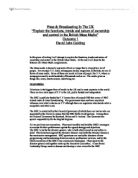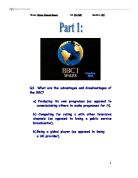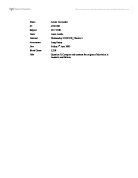They also set certain standards for the time allocated to certain styles of programmes.
There are five categories of channel 3 programmes for which the ITC sets minimum requirements. These are,
- National and International news
Three programmes each day of 20 minutes (lunch), 15 minutes (early evening) and half an hour in peak time.
One and a half hours weekly average
Ten hours weekly average
Two hours weekly average
Varies from franchise to franchise
Although the ITC is involved in licensing and regulating all forms of digital television, the Broadcasting Act 1996 makes it specifically responsible for establishing Digital Terrestrial Television (DTT) in the UK. DTT is especially important because it carries existing free-to-air services provided by the BBC, ITV, Channel 4 (S4C in Wales) and Channel 5.
At present, T.V broadcasting is mainly analogue, however within the next five years it will all be digital.
Digital T.V will bring a bigger choice of programmes to watch, as it will have on average 200 stations.
You can already do shopping and go on the internet with digital T.V, but by the time it takes over analogue completely it will have many more options and facilities.
NEWSPAPERS:
There are many distinguishing features in the British Press. Some of these are things like the differences between tabloid and broadsheet papers or the differences between national, local and regional papers.
There are ten morning daily papers and ten Sunday papers which make up the national press. Fleet Street in London used to be the centre of the newspaper industry, but all the national papers have moved their editorial and printing facilities to other parts of London or away from the capital all together.
National papers are often described as ‘quality’,’mid-market’ or ‘popular’papers because of their differences in style and content. Five dailies and four Sundays are usualy described as ‘qualitie’ papers. These papers are directed at people who want full information on a wide range of public maters. Popular newspapers are for the more light hearted reader. Mid-market publications cover the intermediate market. Quality papers are normally broadsheet (large-sheet) in format and mid-market and popular papers are tabloid (small-sheet) in size.
Scottish editions of national papers usually only change things like the sports page and the T.V listings.
Most places in the UK have their own regional or local newspaper. These can be anything from daily papers to evening ones, Sundays or weeklies. These papers concentrate mainly on local or regional stories although the dailies do print national and international news from a local viewpoint.
Newspapers from the Irish Republic and the British national press are widely read in Northern Ireland.
Several hundred free distribution papers, mostly weekly and financed by advertising, are published in the UK. They have enjoyed rapid growth in recent years.
Ownership of the national, London and many regional daily newspapers lies in the hands of large corporations, most of which are involved in the whole field of publishing and communications (media conglomerates). Local papers however are owned by different companies’ altogether. Newspapers are also controlled by their boards of management. It is possible for two national papers to be owned by the same company and they can even be owned by broadcasting companies as a separate division, however influence between the two types of media is not recommended.
There are local weekly papers for every district in Greater London; these are often different local editions of one centrally published paper.
This does not just happen in London. A prime example of this in our area would be the Press and Journal. It covers the North of Scotland as well as some southern areas as far down as Perth and Stirling, but it produces different editions for every area of which there are eleven. These editions are classed as local editions.
All newspapers are answerable to the press complaints commission, which responds to public complaints about printed items.
RADIO:
There are basically two types of radio in the UK. There is Commercial Radio and The BBC Radio.
The Radio Authority governs commercial radio stations such as Moray Firth radio and XFM. The radio authority is basically the ITC of the radio. Like the ITC it also has no powers over the BBC. The BBC is fully independent.
Although there are far more Commercial radio stations than BBC ones, the BBC is still ahead in ratings.
The gap between and its commercial rivals has widened recently to show BBC Radio to have a share of 51.4% compared with 46.79% for Commercial Radio. In the neck-and-neck race for reach, the BBC edged ahead with 31.2 million listeners compared with their rivals’ 31.1 million. The figures released by RAJAR (Radio Joint Audience Research Limited) cover the period from June 26 to September 17 2000.
Radio can change on a daily basis because the control of its output is not restricted.
The format usually stays the same although major changes in presentation can happen from time to time.
Independent radio station change depending on their income and audience. The better the audience the better the sponsorships and advertisers.
Things like audience talk shows on radio where members of the audience can phone in and participate are very successful.
The BBC and large independent radio companies are controlled in the same way as they are on T.V.
Although the majority are part of larger groups, local radio is controlled by local management. These groups use their own style in the local stations but adapt it to suit the area of broadcast.
VOLENTARY & IN-VOLENTARY CODES OF PRACTICE:
Independent T.V and radio are quite strictly controlled by the ITC and Radio Authority, but magazines and newspapers have more freedom. These, along with the BBC, ITV, Press Complaints Commission and the Broadcasting Standards all enforce their own codes of practice throughout the media. However, the law has the final say in control of the media in the following areas:
Defamation:
A statement which damages the reputation of an individual or company, i.e. false accusations, libel, innuendos, etc.
Obscenity:
The publication or broadcasting of material which will tend to deprave or corrupt.
Incitement of racial hatred:
1986 public order act forbids material which is likely to incite racial hatred.
Blasphemy:
To pass the limits of decency and controversy and outrage Christian feelings. Only applies to Christians.
Sedation:
Forbids the publication of material that incites hatred towards parliament or the monarch.
Official secrets act:
Forbids the publication of official secrets.
Contempt of court:
Forbids you from pre judging a court case or to assume someone is guilty.
MASS MEDIA CONGLOERATE:
Carlton Media Group:
The Carlton Media Group runs the following sixteen companies:
The London Region is one of three areas for which Carlton TV is the ITV broadcaster. Visit the site for regional company news.
The Central Region is one of three areas for which Carlton TV is the ITV broadcaster. Visit the site for regional company news.
Carlton International is the largest distributor of classic British films and the biggest sales house for British TV outside the BBC.
ITN is one of the most respected independent news organisations in the world catering for news, sport, business and entertainments.
The West Country Region is one of three areas for which Carlton TV is the ITV broadcaster. Visit the site for regional company news.
Carries information about programmes on the ITV network.
Television production company Action Time is a leading distributor of entertainments formats, including an extensive home video clip library.
LNN is a TV and production company working for joint shareholders Carlton and LWT.
Carlton cinema is a film channel available exclusively on On digital. Visit the website for comprehensive movie listings.
For information on rates, screen advertising, pitch time, sponsorship and career opportunities at Carlton.
Carlton Communications Plc is the publicly quoted parent company of Carlton Media and other related media companies. Click here for the share price, financial and other investor information.
ONdigital was the first company in the world to launch a digital terrestrial television service delivering multi-channel TV and interactive services into homes through an ordinary TV aerial.
Visit the website for listings.
SimplyFood.co.uk is the UK's No.1 food and drink website and home to the Carlton Food Network. It has a searchable UK restaurant guide and a database of thousands of recipes, plus features and reviews.
On the Carlton Video website you can buy videos and DVD's of many of Carlton's programmes and films, including classics like Inspector Morse, Soldier Soldier, and Britain at War.
PeopleBank is the UK's leading provider of internet recruitment services, bringing together quality candidates and employers. Online since 1995, PeopleBank has extensive experience in providing cost-effective e-recruitment solutions.
HTV, the ITV broadcaster for Wales, was recently bought by Carlton TV. Visit the site of the most popular channel in Wales.
They also have “Carlton Books”.
This shows that Carlton cover broadcasting, publishing, the internet, advertising, and marketing. This means that if Carlton have a successful income level from one of there companies it can benefit all of them and in turn make them more desirable to the public. Because of this they can use control there revenue a lot better without having to pay other companies to do things like marketing.
They sell advertising space to make the initial money to fund projects such as a new drama series. They can then market and publish their own material and because they own all the copyright they can expand by using the internet.
Although there is a national guideline concerning who owns what and the amount of fields you can spread into to prevent companies from becoming “all powerful” and swallowing up smaller companies, Carlton still has it’s eye on “Direct”. This is a group who run insurance and holiday companies.
At present, Carlton are biding for the Scottish Media Group who have two radio stations, a newspaper group, Scottish and Grampian television.
If they are successful in their bid, they will be able to grow to new heights and spread into both radio and print forms of media quite successfully in Scotland.
Functions of the Mass Media:
There are five main functions in the mass media.
Entertainment functions:
This provides healthy amusement and helps to divert the attention of the audience from serious social issues and inequalities.
Information functions:
This helps to structure a particular view of the world and to look at it in geographical, political and social terms.
Cultural functions:
This helps to develop mass culture at the expense of more diverse subcultures. That helps to maintain the status quo in cultural terms, but may also discourage change and growth.
Social functions:
These socialize us into beliefs and relationships which help us operate successfully in society. This naturalizes one view of society and stops us thinking, obtaining and acting on alternative views.
Political functions:
This helps us to understand the operation of politics in our society. However, it gives us the illusion of participating in the political process, but actually endorses the authority of those who continue to run our lives unquestioned.
The media are also capable of shaping opinions about political events and issues.
Current Trends in the Mass Media:
When you think of current trends in the media at the moment two things come to mind, digital and conglomerates. A lot of companies are trying to branch out into other fields of the media at the moment. The Scottish media group for one are trying to expand their interests in radio although this could cause problems with it’s T.V. franchises. There are regulations set up to prevent certain big companies from taking over the media by branching ever wider into it. However there are discussions about these regulations which could result in big firms having huge ownership or control over certain areas of the mass media.
The main trend of the moment has to be the evolution from analogue to digital. T.V. and radio are all a part of the growing trend and it doesn’t look like it’s going to stop there. Already you can tune in to the radio through digital T.V. as well as go on the internet, shop, play games, the opportunities are endless. The future however lies with a fully digital T.V. without the aid of ugly dishes on the side of your house or cumbersome boxes on top of you tele. With this you will be able to access anything you want. There will be no set programs, no times, just you, your T.V. and the whole media world at your fingertips. You will be able to pick anything to watch, read, here, play, buy, or do from your tele.
This astonishing development is proving very expensive to produce, run, and buy if it is ever released.
If it is released it will be the main media related technological break through in history.








